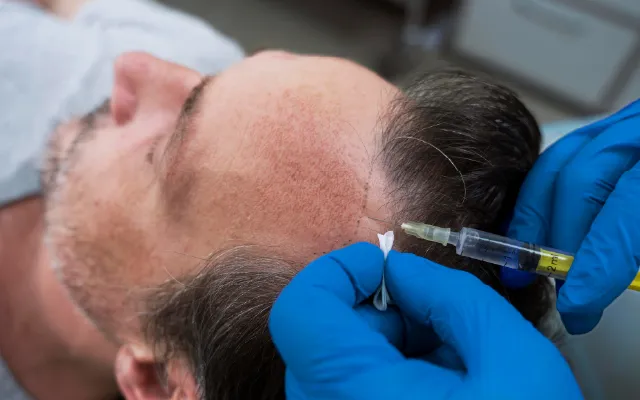
Male baldness, commonly known as age-related baldness, is a phenomenon that affects both
men and women. The causes of age-related baldness vary, including genetics, hormonal
changes, and other conditions.
Baldness in men usually begins with reduced hair growth on the forehead and crown. The head
results in the formation of "baldness". Baldness in women is usually manifested by thinning hair
all over the head.
Hair Loss Treatment depends on the cause and may include medications such as minoxidil or
finasteride, hair removal surgery, or other methods. It is also important to consider that some
irritations may be associated with other diseases, in which case it is recommended to consult a
doctor for Baldness treatment.
Alopecia, a condition that affects many people worldwide, is not only a cosmetic problem but
can also affect a person's mental health and well-being. Understanding hair loss's complex and
multifactorial nature is critical to solving this problem.
Alopecia, or hair loss, can take many forms, from mild thinning to complete baldness. Factors
that cause hair loss include genetics, hormonal changes, medical conditions, and lifestyle
choices. Advances in medical science have paved the way for many treatments to address the
different needs and causes of hair loss in humans.
Hair Loss Types and Causes
The severity and type of hair loss, medically known as alopecia, varies. The most common forms include male pattern baldness, alopecia areata, telogen effluvium, and anagen effluvium. Each type has its characteristics and principles that require a good approach to treatment.
- Male Alopecia: This type, also known as male or female pattern baldness, is the most common type of hair loss. It is mostly hereditary and is characterized by progressive hair growth, primarily on the head and forehead. Baldness in men is often associated with hormonal changes, especially dihydrotestosterone (DHT), a form of testosterone.
- Alopecia Areata: This autoimmune disease causes hair loss, which can be complete baldness (alopecia totalis) or complete hair loss. Loss of body hair (alopecia universalis).
- Telogen effluvium: This form is usually temporary and is usually caused by stress, illness, or hormonal changes. It involves many hairs entering the telogen phase of hair growth, which causes expansion.
- Anagen Hair Loss: Often associated with medical treatment, this type of hair loss occurs during the anagen phase of the hair cycle. Since the drug affects the hair follicles, it can cause rapid and widespread hair loss.
Understanding the types and causes of hair loss is important in choosing the appropriate Baldness treatment. The latest research in dermatology and trichology provides insight into the biology of hair growth and loss, supporting treatments for specific hair types.

Hair Loss Treatment
Hair Loss Treatment have evolved, with options ranging from medical treatments to natural treatments and advanced hair removal techniques. The choice of treatment depends on the type and severity of hair loss, the patient's preferences, and general health conditions.
Natural Remedies and Lifestyle Changes
Natural remedies and life changes can sometimes help control hair loss. These include:
- Eat nutritious foods rich in iron, zinc, and protein
- Avoid heavy hair styling and conditioners
- Use gentle hair care products
- Meditation, yoga, and exercise reduce stress
- massage your scalp to stimulate blood flow
- Treatment of hair loss
There are many Hair loss medications to treat hair:
- Minoxidil (Rogaine): Scalp treatment is over
- Propecia (Finasteride): Medicine for Men
- Hair Transplant Surgery
- Laser Therapy
Each treatment has its pros and cons and works differently for people. It is important to consult a doctor for a suitable treatment plan.
New Hair Loss Treatment and Research
The latest research into hair treatment has focused on new methods such as:
- Stem cell therapy
- Platelet-rich plasma injections
- Gene therapy
- New drugs
These emerging hair loss treatments are promising, but more research is needed to determine their benefits and safety.
Hair Loss Treatment Centers in Nursing and Rehabilitation
Alopecia, seen especially in nursing homes and rehabilitation centers, will be an important
problem affecting the elderly's self-confidence and life quality. In these cases, special methods
must be followed.
Hair loss in adults can be caused by aging, disease, medication, or nutritional deficiencies.
Caregivers need to understand these factors so they can provide appropriate care.
The role of nursing staff in hair loss management
Nursing staff plays an important role in hair loss management. They can:
- Monitor patients for signs and psychological effects of hair loss.
- Helps use local medications such as Propecia as prescribed.
- Maintain a healthy diet to promote healthy hair.
- Share the treatment with the doctor.
Hair Loss Rehabilitation Strategies
Rehab Centers can provide strategies to manage hair loss, including:
- Physical therapy to promote healthy skin.
- Support for hair loss.
- Hair care and care training.
Integrating Hair Loss Treatment with Holistic Care
In these centers, holistic hair treatment is integrated with the treatment plan. This includes:
- Regular evaluation of the hair and scalp.
- Create a self-healing plan based on personal health.
- Collaboration between dermatologists, nutritionists, and primary care physicians.
Advice and Research
Dermatologists and hair therapists recommend personalizing hair care. Research shows that combining medications with lifestyle changes is effective. Ongoing research on genetics and stem cell therapy promises to provide new insights into hair care.
The future of hair loss treatment
The future of hair loss treatment lies in precision medicine and advanced technology. Advances in genetic research and regenerative medicine will lead to more effective and personalized treatment.

